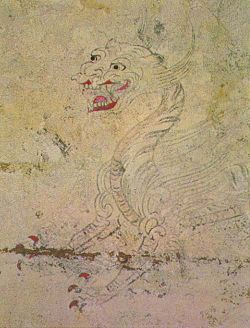The White Tiger (Chinese: 白虎; pinyin: Báihǔ), is one of the Four Symbols of the Chinese constellations. It is sometimes called the White Tiger of the West (西方白虎; Xīfāng Báihǔ). It represents the west in terms of direction and the autumn season.
| White Tiger | |||||||||||||||||
|---|---|---|---|---|---|---|---|---|---|---|---|---|---|---|---|---|---|
 Bái Hǔ sculpture on an eaves tile | |||||||||||||||||
| Chinese name | |||||||||||||||||
| Chinese | 白虎 | ||||||||||||||||
| |||||||||||||||||
| Korean name | |||||||||||||||||
| Hangul | 백호 | ||||||||||||||||
| Hanja | 白虎 | ||||||||||||||||
| |||||||||||||||||
It is known as Byakko in Japanese, Baekho in Korean, and Bạch Hổ in Vietnamese.

Seven Mansions
editAs with the other three Symbols, there are seven astrological "Mansions" (positions of the Moon) within the White Tiger. The names and determinative stars are:[1][2]
| Mansion no. | Name (pinyin) | Translation | Determinative star |
|---|---|---|---|
| 15 | 奎 (Kuí) | Legs | Eta Andromedae |
| 16 | 婁 (Lóu) | Bond | Beta Arietis |
| 17 | 胃 (Wèi) | Stomach | 35 Arietis |
| 18 | 昴 (Mǎo) | Hairy Head | Alcyone |
| 19 | 畢 (Bì) | Net | Ain |
| 20 | 觜 (Zī) | Turtle Beak | Meissa |
| 21 | 參 (Shēn) | Three Stars | Alnitak |
See also
editReferences
edit- ^ "The Chinese Sky". International Dunhuang Project. Archived from the original on 2015-11-04. Retrieved 2011-06-25.
- ^ Sun, Xiaochun (1997). Helaine Selin (ed.). Encyclopaedia of the History of Science, Technology, and Medicine in Non-Western Cultures. Kluwer Academic Publishers. p. 517. ISBN 0-7923-4066-3. Retrieved 2011-06-25.